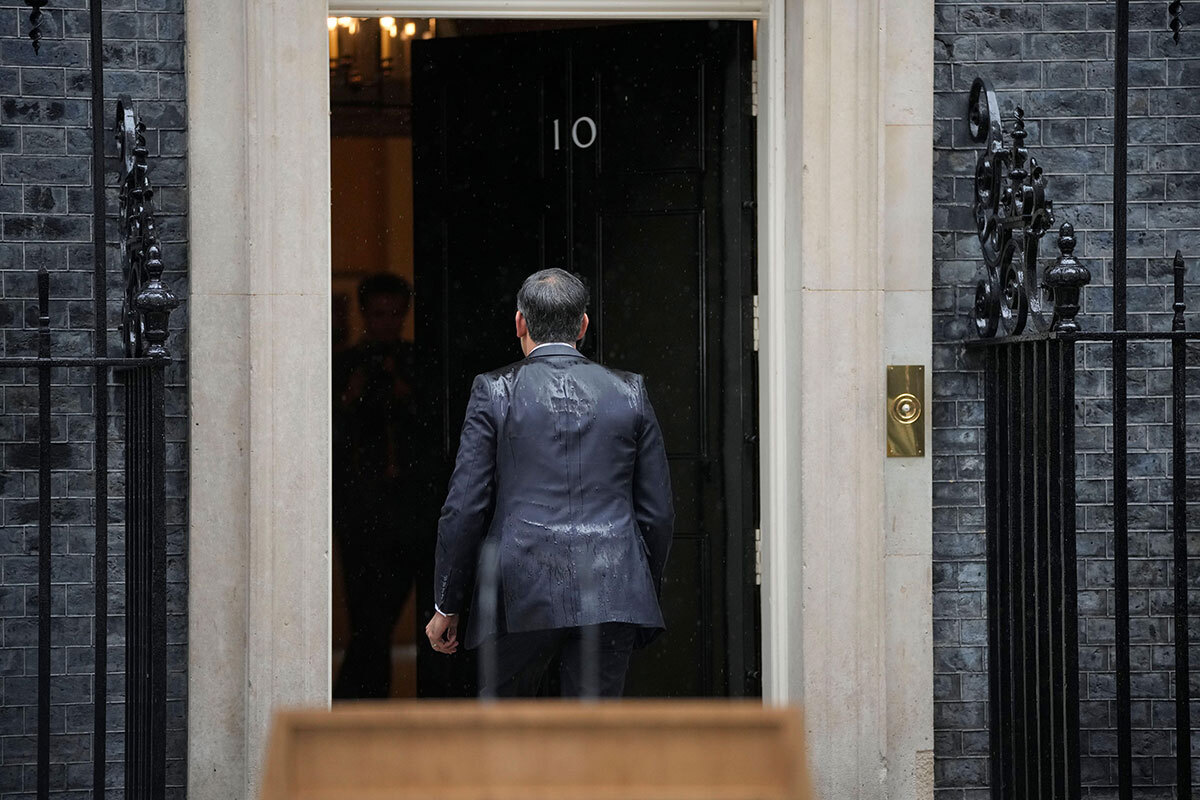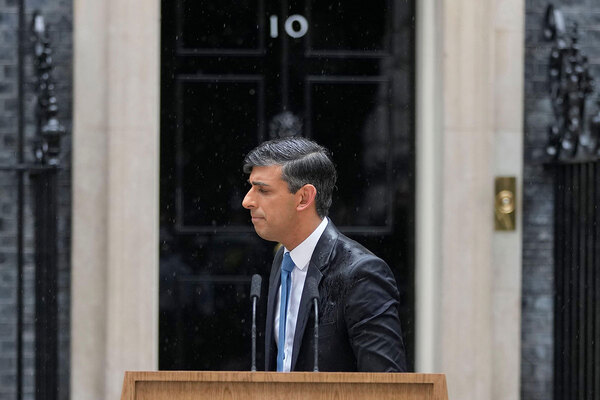You are viewing 1 of your 1 free articles
The Week in Housing: do not let the general election overshadow the Grenfell Tower Inquiry
The Week in Housing is our weekly newsletter, rounding up the most important headlines for housing professionals. Sign up below to get it direct to your inbox every Friday

Good afternoon.
Prime minister Rishi Sunak’s decision to call a general election in the rain this week will keep what the The Thick of It, a BBC comedy series, calls “the nutters” in media and politics fawning over each for weeks on end until voters go to the polls on 4 July.
Whoever the government is, arguably the most important thing in their in-tray will be to implement the outcomes of the second and final report on the Grenfell Tower fire, which the inquiry revealed this week will be published on 4 September.
It came just one day after the Metropolitan Police announced during a briefing at New Scotland Yard that criminal trials relating to the fire will not begin until at least the middle of 2027.
Grenfell United, the bereaved families and survivors group, said it needs to know that recommendations from inquiry chair Sir Martin Moore-Bick will be implemented by the new government in power.
The group said: “Nearly five years since the publication of the first report, the Tory government has failed to implement four of the phase-one recommendations.
“That is why we are calling for a national oversight mechanism: an independent public body responsible for collating, analysing and following up on recommendations from inquiries into state-related deaths.
“Hundreds of vital recommendations are made following inquiries and millions of pounds are spent, but what is the point if there is no system in place to make sure changes are made?”
Quite.
It is an important question, and if you are wondering why it still needs to be asked, you can look no further than the Building Safety Regulator (BSR) conference in Birmingham. Sector professionals told attendees at the event that the government’s lack of response to a construction product safety review was causing “a real problem”.
In response to a question from Inside Housing on the impact the delay was having on testing and product safety, Amanda Long, chief executive of the Code for Construction Product Information, said: “It’s a real problem. The longer it takes, it creates a void, and this creates inertia.”
One roof manufacturer told attendees that the delayed response to the review was affecting his firm’s ability to test certain types of products.
Earlier in the session, an audience member had asked how the industry could ensure it was taking on board the criticisms laid out in the Hackitt Review.
In May 2018, Dame Judith published the much-anticipated Building a Safer Future report, which called for an overhaul of the regulatory regime for tower blocks. It was set up to review regulations after the Grenfell Tower fire. In the review, Dame Judith slammed the construction industry for engaging in a “race to the bottom” when it came to price and quality.
On this issue, a delegate at the BSR conference said: “We have got to clear out the bottom feeders from the industry.”
Delegates were also told that “cultural change is needed to build trust and safety in residents”.
Behaviour and cultural change were the themes of the event. In his keynote address, the chief inspector of buildings told the packed main conference hall: “Without the right behaviour, we will continue to see poor outcomes and associated blame culture.”
Ahead of the BSR conference, the National Fire Chiefs Council reiterated its concern over the lack of a requirement to retrofit existing residential buildings with sprinklers.
Inside Housing was also at UKREiiF this week. Deputy Labour leader Angela Rayner used the event to set out a promise to deliver 40% affordable homes on new development as part of her party’s plan for a new generation of New Towns.
Also at this event, Salford mayor Paul Dennett said he was “very worried” about housing associations due to a lack of certainty from the UK government over the future of the Local Housing Allowance (LHA).
Away from LHA, the managing director of Oxford City Council’s development company told Homes England that it should take a longer-term approach to funding bids to avoid stymieing development. Helen Horne of OX Place said the bidding round for funding “stagnates development”.
She said: “We had to put nine sites together to hit the investment rates that Homes England wanted.
“I think that central government should look more at longer-term developments and not just unlocking individual sites.”
“The bidding round doesn’t work,” Ms Horne added. “Because of the political cycle, they want quick wins.”
The concern about funding timelines came as provisional figures released by Homes England showed it is expected to exceed its annual delivery targets for the number of new homes started and completed in 2023-24. The government’s housing and regeneration agency said it enabled the completion of more than 32,000 homes in 2023-24, compared with a target of 29,641.
The body also helped to start construction of 35,000 homes, above its government-set annual target of 32,967.
Inside Housing had planned to ask Peter Denton, chief executive of Homes England, about the funding timelines and the latest figures, but he pulled out after the general election announcement due to the purdah. This is the period when the government, ministers and civil servants will exercise caution in making announcements or decisions that might have an effect on the election campaign.
Still, it doesn’t really start until next week.
When the government was in session, MPs expressed concerns over fake signatures being used on External Wall System 1 (EWS1) forms during the sale of homes.
Clive Betts, chair of the cross-party Levelling up, Housing and Communities Committee, wrote to the Royal Institution of Chartered Surveyors and the Fire Industry Association to ask how homebuyers who require an EWS1 form can help to ensure the form is valid. In the letter, he raised concerns that signatures on the forms could be faked and asked for an assessment of the likely scale of the problem and its impact on the process.
The forgery of an EWS1 form for a building in east London was revealed by an Inside Housing investigation in 2021. The following year, Merseyside-based property manager Thomas Clarke received a 15-month custodial term, suspended for two years, after he had signed 55 EWS1 forms with the name of a former colleague, Sophie Magee, without her knowledge.
In response, the Building Safety Regulator put out a statement on social media platform X that suggested abuse and fraud is still taking place on a large scale within the EWS1 system.
This week, the government launched a consultation to allow social housing tenants to access information about the management of their homes. Landlords will have to provide the information unless it is “reasonable not to”, with clear expectations on how landlords should respond to requests.
Tenants will be able to raise complaints to the Housing Ombudsman if they are not happy with how their information request has been handled.
For its part, the ombudsman named a dozen landlords as part of its commitment to share the learnings in its latest severe maladministration report. This was done as part of its latest publication this month, in which the watchdog highlighted three key cases that it said speak to themes from its recent Spotlight report on knowledge and information management.
There is a look at who the recently elected metro metro mayors are and their plans for housing, as well as whether AI can help assess housing need and deliver more social homes.
Landlords should also find out about a work experience programme which is aiming to get more ethnic minority people to work in London’s built environment.
Finally, Inside Housing launched its Housing Hires campaign to promote the social housing sector as a place to work and support people to find and develop careers with housing associations and councils.
Have a great weekend.
Stephen Delahunty, news editor, Inside Housing
Say hello: stephen.delahunty@insidehousing.co.uk
Editor’s picks: five stories you may have missed
Clarion sets 20% biodiversity uplift target for new developments
Strategic action is needed now to halt housing crisis, NIFHA says
DLUHC signs deal to speed up use of ‘cutting-edge’ technology in planning process
Housing association and house builder sign 575-home west London development deal
London Councils warn Gove that short-term lets policy could worsen housing crisis
Sign up for our Week in Housing newsletter
Already have an account? Click here to manage your newsletters











